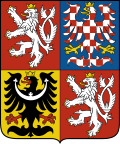| ||||||||||||||||||||||
Do you agree with the Czech Republic becoming a member state of the European Union in accordance with the Treaty on the Accession of the Czech Republic to the European Union? | ||||||||||||||||||||||
| Results | ||||||||||||||||||||||
|---|---|---|---|---|---|---|---|---|---|---|---|---|---|---|---|---|---|---|---|---|---|---|
| ||||||||||||||||||||||
 |
|---|
| |

A referendum on joining the European Union was held in the Czech Republic on 13 and 14 June 2003. The proposal was supported by 77% of voters, with a turnout of 55%. The Czech Republic joined the EU on 1 May 2004.
Contents
As of 2025, this was the most recent and only national referendum in the Czech Republic.
